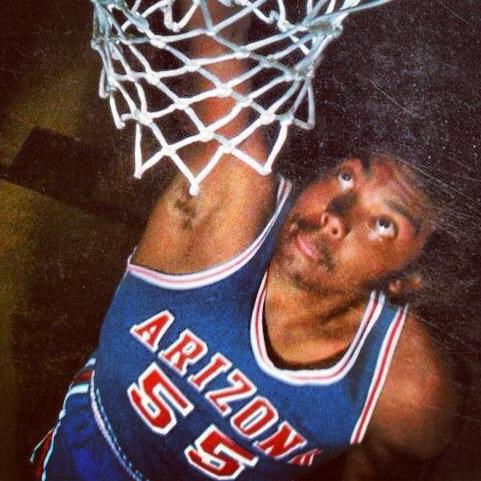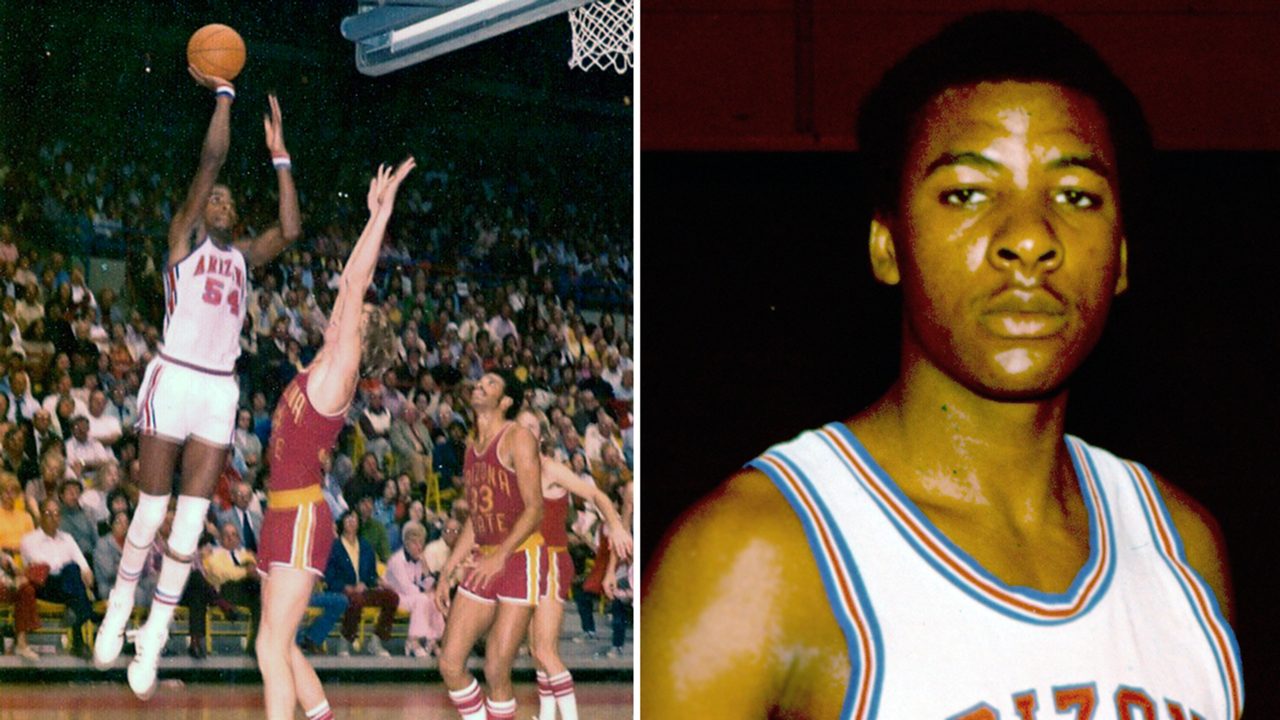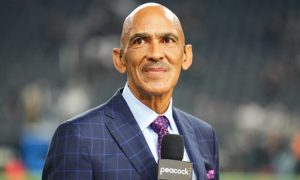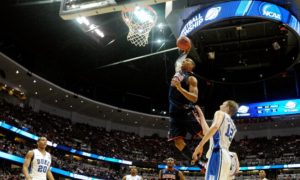A question that popped up on social media and message boards yesterday involving Deandre Ayton after he earned the Karl Malone Award for the top power forward in the nation on Friday: Should his jersey be recognized now by Arizona at McKale Center?
The answer is yes, according to Arizona’s guidelines for jersey recognition for meeting the criteria of winning a national player of the year award. Would it be the right move to honor the most talented player to wear an Arizona uniform? No question. Ayton, who wore No. 13, is a one-year wonder already moving on with NBA aspirations.
This is not to indicate Ayton is the best player overall to attend Arizona. That honor should still go to Sean Elliott, who in a four-year career earned the John Wooden Award for the nation’s top player and holds the school scoring record at 2,555 points.
Nobody has worn No. 32 since Elliott last played at Arizona in 1989, but let’s get this straight to avoid confusion: numbers are not retired at Arizona.
Arizona states that jerseys of student-athletes are recognized, not individual player numbers. In other words, a number can’t be retired. That’s why in recent years Lauri Markkanen wore Mike Bibby’s No. 10 and Keanu Pinder wore Steve Kerr’s No. 25.
Let’s hope it remains that nobody wears Elliott’s No. 32.
Arizona’s ICA (Intercollegiate Athletics) Heritage Committee, comprised of staff members, makes the final decision on jersey recognition. Its requirements are as follows:
Only student-athletes and letterwinners who meet the following criteria are eligible to have their jersey recognized.
— Must already be inducted into the University of Arizona Sports Hall of Fame as an individual
Must meet one of the following criteria:
–Received a national player of the year award
–Received a major national “athlete of the year” honor
–Have been inducted into The National Football Foundation College Football Hall of Fame
–Named Most Outstanding Player at an NCAA Division I Championship for Men’s Basketball, Women’s Basketball or Volleyball
Because Ayton earned the Karl Malone Award for the top power forward in the nation, he qualifies under the “received a national player of the year award.” That means Stanley Johnson, who earned the Julius Erving Award for the top small forward in the nation in 2015, also qualifies.
Kerr’s jersey is recognized because he earned the United States Basketball Writers Association’s Most Courageous Athlete award in 1988. Jason Terry, Jason Gardner and Mike Bibby have their jerseys recognized because they won various national player of the year honors, including Bibby and Gardner with freshman of the year.
Miles Simon’s jersey hangs from atop McKale Center because he was the most outstanding player of the NCAA tournament when Arizona won the national title in 1996-97.
One name that is missing that should be honored: Bob Elliott (no relation to Sean), a three-time Academic All-American from 1974-77 and member of the GTE Academic Hall of Fame (1975 inductee).
The ICA Heritage Committee must make a revision, in my opinion, to its requirements to allow an extraordinary accomplishment in relation to that sport for jersey recognition.

Bob Elliott goes for two back in the mid 1970s while at Arizona (University of Arizona photo)
Bob Elliott is one of only 111 players in the history of college basketball — at all levels — to achieve at least 2,000 points and 1,000 rebounds in a career. He had 2,131 points and 1,083 rebounds in his career.
The short list of players to achieve that feat include the likes of Lew Alcindor, Larry Bird, Elgin Baylor, Jerry West and Oscar Robertson.
What gets overlooked: Bob Elliott did not have the means in the 1970’s to become nationally known like today’s athletes with social media and cable/satellite television. He played in the WAC and was not on national television every week. He became known outside of Tucson through newspaper clippings. Given his production rate at Arizona, if he played today, he would certainly be in contention for national player of the year honors.
Bob Elliott, who was part of Arizona’s first Elite Eight team in 1976, gets emotional when talking about whether his jersey should be recognized by his alma mater.
Bob Elliott’s name is included among the 22 players who have earned entry into McKale Center’s Ring of Honor.
In order to join this elite group, players must meet at least one of the following six criteria:
1. First-team All-America recognition by one or more of the major national organizations or media.
2. Major national “player of distinction,” i.e. the Wooden Award or other honor of significance
3. Pac-12 Player of the Year or Pac-12 Freshman of the Year
4. Arizona career leader in three or more major positive career categories at the conclusion of his collegiate career and must hold the career record for a minimum of five years (excluding single-game records)
5. Ten or more years of experience in the NBA or selection as an All-Star.
6. Olympic medalist.

Al Fleming has held Arizona’s career rebounding record of 1,190 for 42 years (University of Arizona photos)
Elliott’s former teammate, the late Al Fleming, should be included in the ring of honor but he is not. That’s a travesty. Fleming, one of the best power forwards to play for the Wildcats, has held the career rebounding record of 1,190 since his career ended in 1976. The “three or more” career records as a qualification is too much. One should be fine, especially with rebounding.
The list of players in the ring of honor:
Bob Elliott, C, 1974-77
Steve Kerr, G, 1984-88
Sean Elliott, G/F, 1986-89
Jud Buechler, F, 1987-90
Sean Rooks, C, 1989-92
Chris Mills, F/G, 1991-93
Khalid Reeves, G, 1991-94
Damon Stoudamire, G, 1992-95
Miles Simon, G, 1995-98
Jason Terry, G, 1996-99
Mike Bibby, G, 1997-98
Michael Wright, F, 1999-2001
Richard Jefferson, F, 1999-2001
Jason Gardner. G, 2000-03
Luke Walton, F, 2000-03
Salim Stoudamire, G, 2002-05
Gilbert Arenas, G, 2000-01
Channing Frye, C, 2002-05
Chase Budinger, F, 2007-09
Derrick Williams, F, 2010-11
Andre Iguodala, F, 2003-04
Aaron Gordon, F, 2014
Nick Johnson, G, 2012-14
Stanley Johnson, G, 2015


















